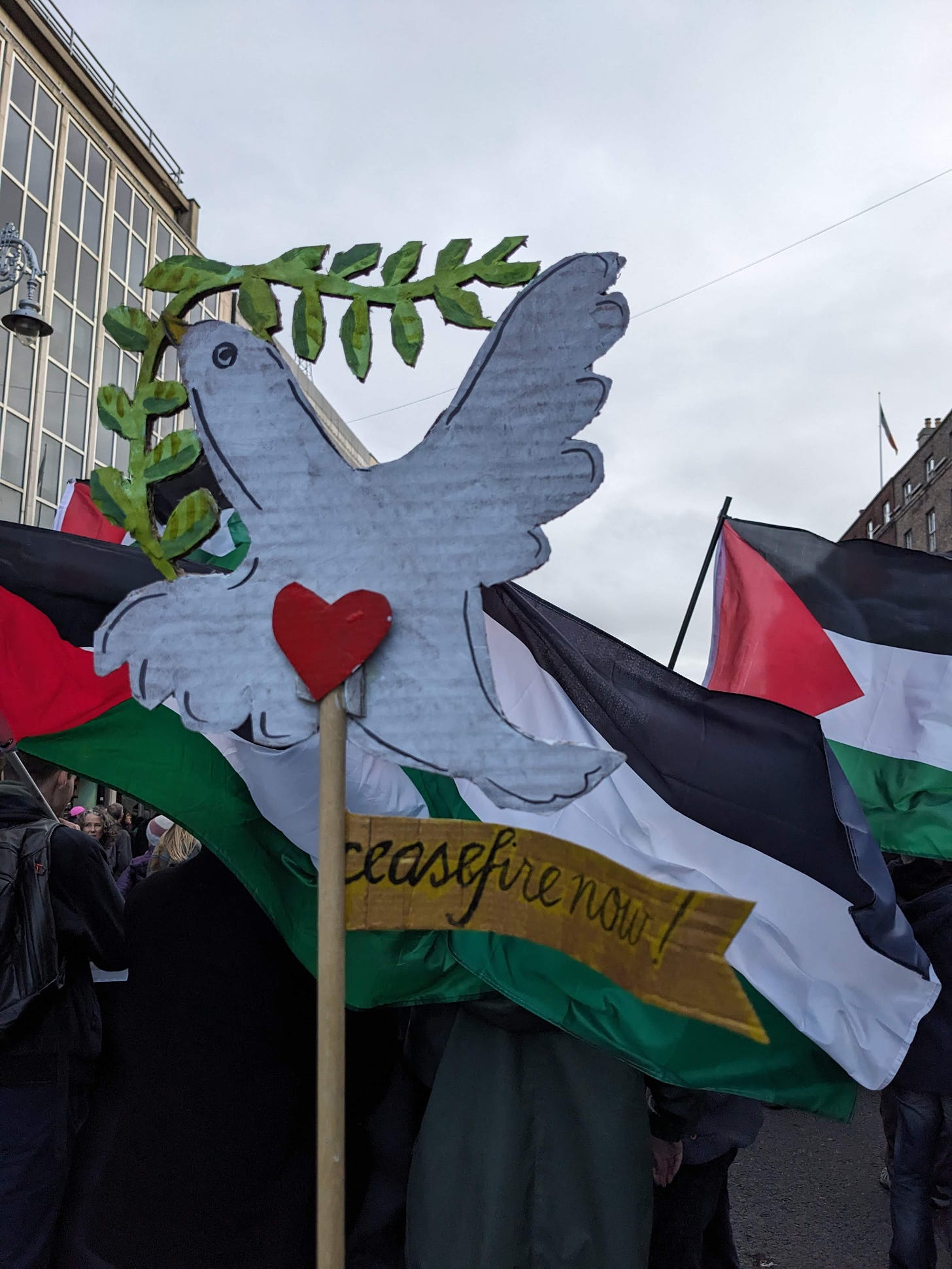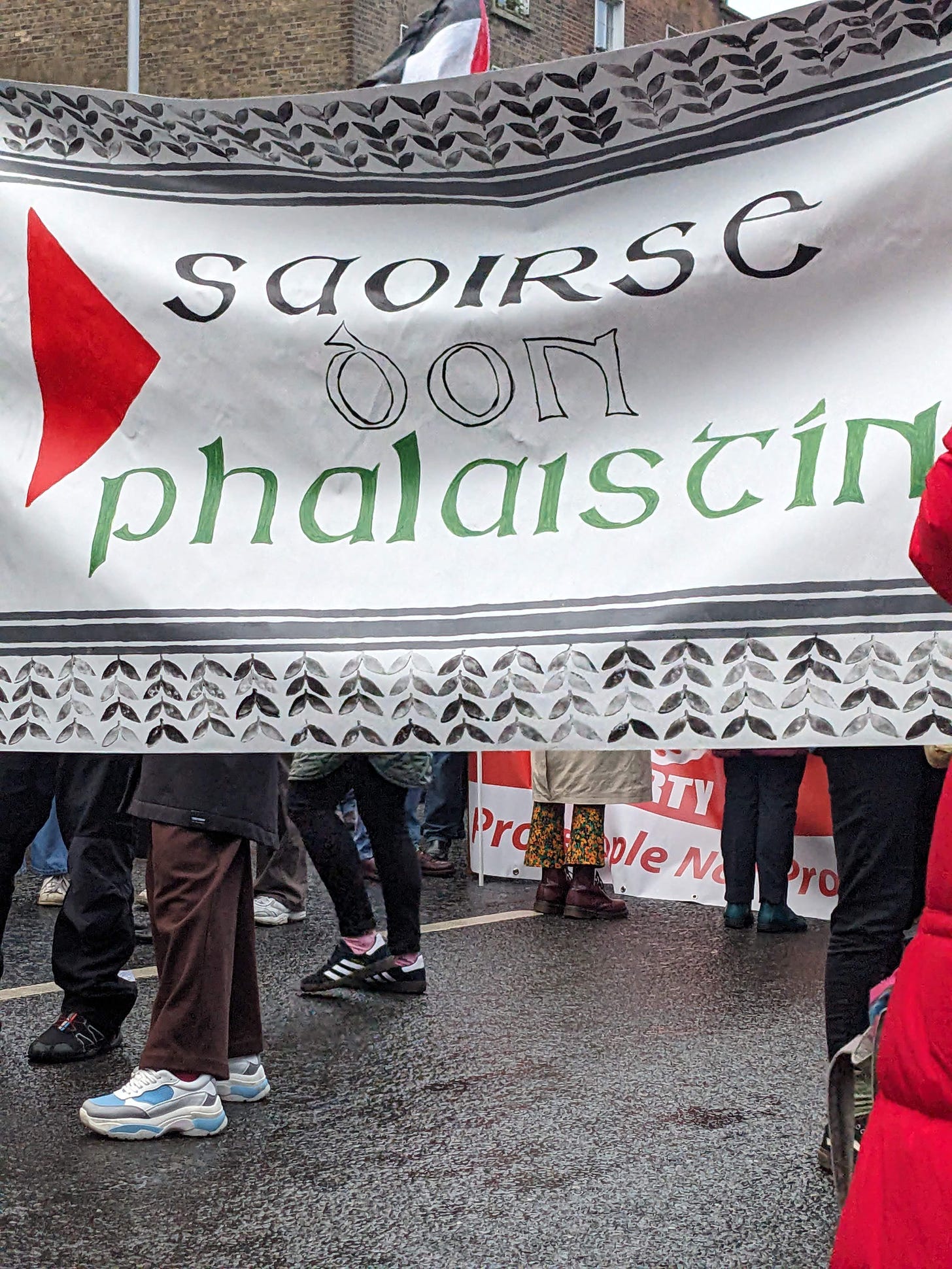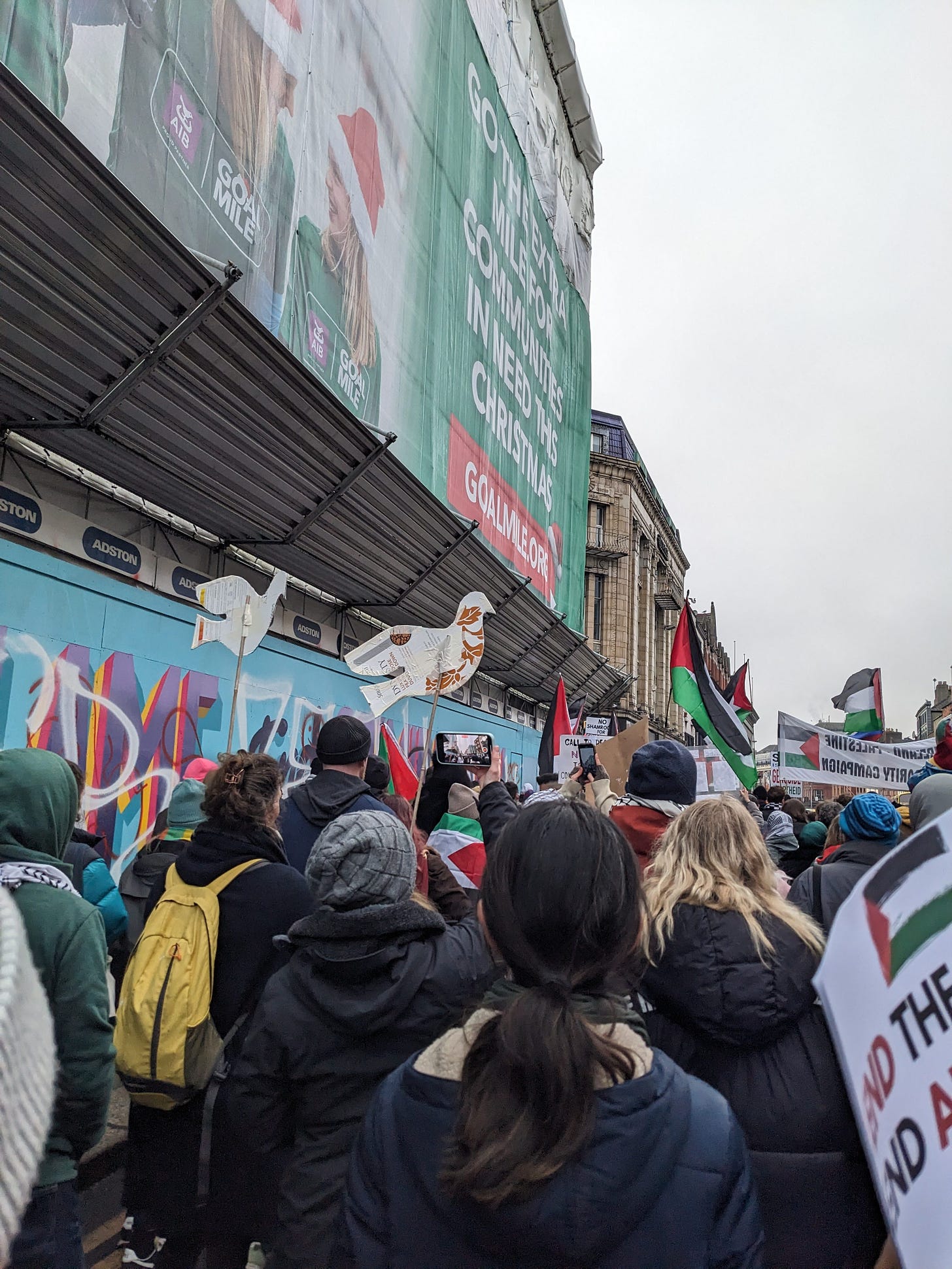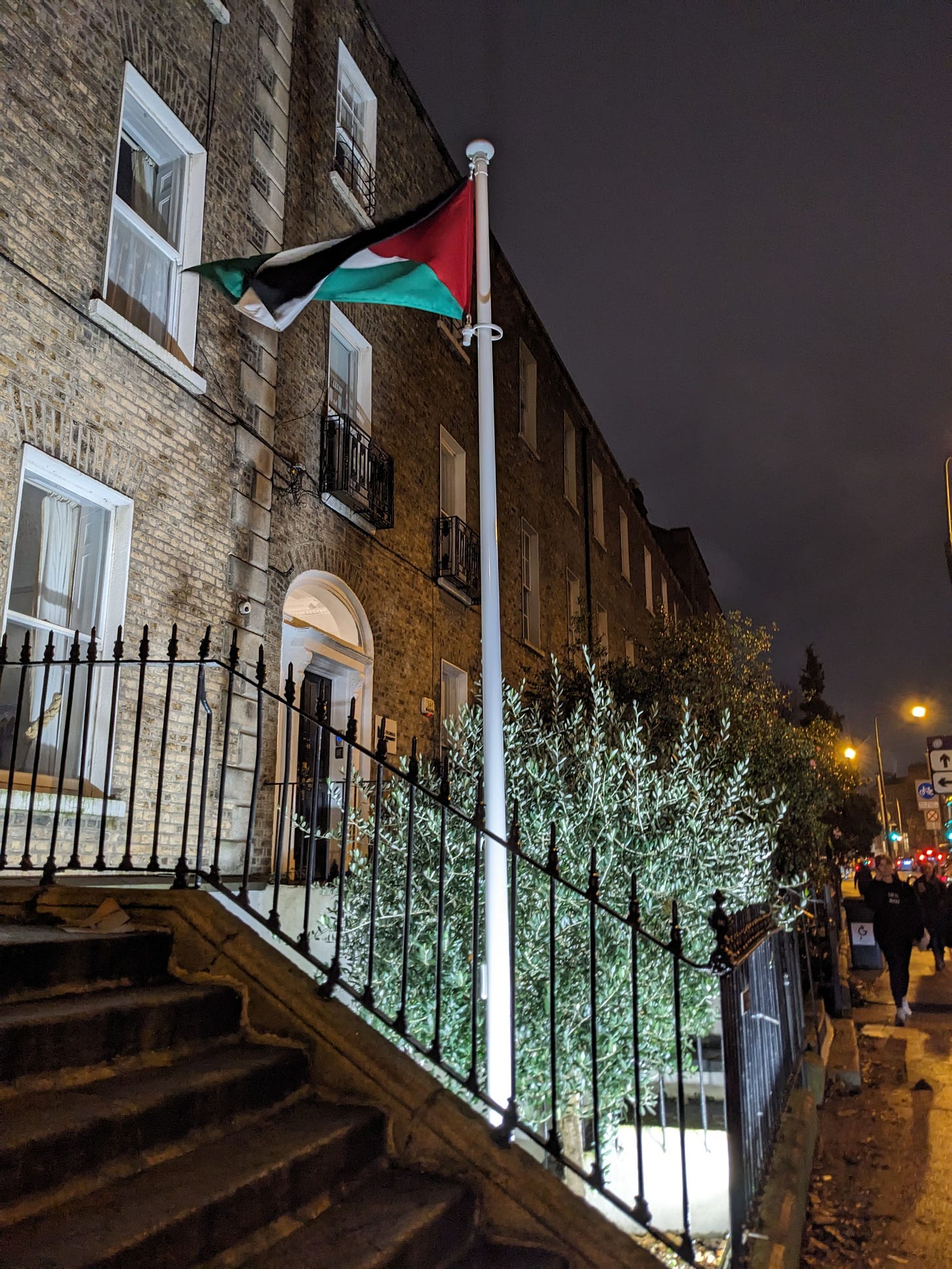I have been thinking about the walking protests I have taken part in since October. We have walked together almost every week. I like these walking protests. I like to walk among others, in the same direction, taking up space in public. I realize as we walk how meaningful it is that we are together. It is easier to say what we believe when we are not alone. I also realize that there, together in the comfort of our unbombarded city, it is clear to us that our job is to say that people over there should not be subject to death. I note that this clarity allows us to occupy the position of accusers (of the bringers of death, who do deserve accusation—the world itself deserves that truth. We should call death-bringing death-bringing, and we should oppose it). It feels righteous when we say it: no death. Ceasefire. No armaments manufacturing or transport. These are the right things to say, because they are true: people 'over there' should not be subject to death. It is absolutely true that this is the case. Even when there is little we can do ourselves to directly cause those deaths to cease, at a minimum we should say, in public and to one another, that those deaths must end.
It is also true that, according to the WHO, 8700 people across the world died following/of covid between December 23, 2023 and January 21, 2024. 8700 people in a month! (The Economist, of all places, just published a study on worldwide excess deaths that is deeply sobering and that indicates that counts like the WHO’s are if anything conservative underestimates.) It is further true there are very simple things we can all do to reduce that death, including but not only wearing a good, well-fitting mask in public spaces. And yet I observe that among the many in the antiwar movement right now, most of us do not wear masks in public spaces, despite a massive increase in transmission over the past twelve weeks. When I go to walking protests, where we are shoulder to shoulder with one another, shouting and walking through one another's shouts, I am generally one of just a handful of people wearing a mask. (A lot of the protests have happened since the JN.1 variant came into circulation—the higher transmissibility of this variant made me reconsider my usual decision not to wear a mask outdoors.)
This is not an accusation; it is an observation. This is not a ranking; it is a relating. I am curious about what I have observed because on the one hand we are there, together, insisting that life is precious. We insist that colonialization, apartheid, occupation, and bombardment are foul. They are foul. We should insist that they are. And at the same time as we make this insistence, there is the co-present fact of viral transmission, transmission of a pathogen that can hurt and kill anyone, and that disproportionately hurts and kills people who are already vulnerable by way of class, race, disability, and age. And there is the further fact that a very simple intervention that could be taken by most of us is not taken. Which feels to me like tacit obeisance to the forces by which life is made cheap—those forces we refuse together, there in the street.
Why is this? What makes it easier to march and shout, to oppose death afar, than to wear a mask to the grocery store, on the bus, to work, thereby involving oneself in nearby deaths? Is it that closeness itself? Is it that one feels active and the other passive? Is it the group-belonging of marching, shouting? Is it that the mask reminds us we, too, may visit death upon a seen or unseen other person? Is it that the mask reminds us of our own fears, so recently acute, of mortality? Is it that, because the deaths of others from covid are mostly hidden rather than made spectacular—hidden, in fact, as a kind of social comfort—, we do not think of them when we take to the streets against death? It may, it occurs to me, be to do with all kinds of discomfort: it is not pleasant to wear a mask in public—neither physically comfortable nor socially. It can feel confrontational for others, even in leftist spaces. I see that confrontation; it shows up as avoidance (eye contact, conversational inclusion are so diminished when one is the only person wearing a mask) and it also shows up as aggression, as when, recently, a person huffily and assertively closed windows in an otherwise unventilated room despite five of us wearing masks and one asking her politely to leave a window open. Wearing a mask in public in 2024, one is confronted with evidence that most people around one think that perhaps one is being just the littlest bit hysterical, just the slightest bit puritanical. (Though my feelings are not the point of my enquiry, I will acknowledge that this is, to be frank, exhausting.) So I can understand why people might not wear one. Immediate discomfort is a great disincentive. Perceptions of social norms—the minute behaviors that tell us how best to belong to groups and also tell us about safety and trust—are great incentives.
Don't misread me: this is not a "why does issue X get attention, and not issue Y?"; not at all. We should and must actively refuse war, colonialization, apartheid, occupation, torture, killings of press, bombings of civilians and of infrastructure, and all the other spectacular degradations of life, land, and dignity happening in Gaza as well as elsewhere. I am simply pointing out that if we are to make this refusal of death and degradation it seems incongruent not to turn the same refusal on those less spectacular and closer-to-hand points in our daily lives where death and degradation also seep through. Your lungs, my lungs, the lungs of a person far from us—one set of lungs. Your life, my life, the lives far from us that we may never witness—one life.
So this is not an either/or proposition. It is a proposition that we practice seeing the entire scale, from telescopic to microscopic. It is a question about whether and how we can (ever more) intricately and continuously trace the threads that tie us to one another. Can we see that when we quote Baldwin and say that “the children are always ours”, we should, we must, we cannot but also mean the children who are repeatedly exposed to a virus that can and does often have life-altering effects, and the children who have been orphaned or suffered parental death due to covid, and the children who have died from it? Is the answer, “well, that outcome is relatively rare” sufficient or just? What does such an answer reveal about our commitments to one another? Are there really some deaths we are willing to countenance? Which ones? How many? Whose? In exchange for what? What are we willing to do to hold one another precious at this easily overlooked, inconvenient and personal end of the scale, as well as at the scale of political and social geographies larger than our (permeable, shared) vascular systems?
It is relatively easy to commit to a cause when I can stand in the place of accusal and point to the wrong happening over there. It is harder to remember that I live inside of systems that normalize the degradation of life, not only on the scale of spectacle (though on that scale, absolutely) but also on the minute scale of the everyday, and to turn a questioning gaze back on my participation in those systems—to try to see how those systems of everyday degradation make possible the spectacle of death that my taxes pay for, for example. This is difficult in part because such systems of degradation often do just feel like normal life, and in part because the refusals they require are subtle. Blatant horror is easier to see; the responses it demands are also more apparent. And our refusals must, when required, be spectacular: to meet the spectacular degradations of occupation, colonialization, war. But I think that these refusals are given strength, that we learn endurance for them, by the discernment required to see the presence of degradation in our daily lives and to refuse it there, too.
I struggle, personally, with the disjunct between the refusal of spectacular death and the acceptance of everyday death. Poor people, immigrants, Black people, brown people, Native people, workers in factories and slaughterhouses, nurses, teachers—these are the people who have died the most since 2020 because of covid. But anyone can become very ill; anyone can die because of it. Surely these deaths, too, call for our attention. Surely they, too, call us to refuse suffering, even if to do so requires some sacrifice on our parts. Surely covid circulates among the bombed-out buildings and in refugee centers in Palestine. Is it not my affair to reduce the possibility of death or prolonged illness in this way, too? In these places, too? I think it is. Not ‘instead’. Not ‘either’. As well. Don’t my places touch your places, and don’t our places touch those places far away, linked as we are by the circulation of air, of transit, of cargo? Certainly I am connected to the chain of transmission (airplanes, classrooms, public transport, shops) that brings the virus around the world. In any case, I have enough attention, enough heart to break, enough conviction, enough energy, enough willingness for both of these—and more. No island. Your need touches me. Your life obliges me. Even when you are beyond my sight.
I do wear a mask—in shops, in buses and trains, in the movie theater, in class, in my office. It is uncomfortable in all the ways you already know: headaches, the little cut on the bridge of the nose, humidity, etc. It is also uncomfortable because to take this small action does attract negative attention in public spaces. On the better end of the negative scale it yields invisibility: I have never experienced so much social exclusion as in the past few years, and, talking to other people who wear masks to social events, I know I am not alone. Wearing a mask, people’s eyes skim over you in conversation. We have not all learned to watch or listen for cues that don't include the mouth. I get asked about my mask weekly, sometimes by the same people—why a mask, what kind of disease do you have, are you sick, what’s wrong with you, are you afraid, are you immunocompromised. (The bizarre experience of having strangers quiz you on your health after the last few years could probably be an essay in its own right.)
I'm mortal, I want to say, and so are you. I don’t; for that all I am typing this essay (with figuratively shaking fingers, because I worry it may upset you or provoke you, irritate you or offend you, and I really don’t want to do those thing) I am not that brave; I am averse to confrontation. I usually say "I have an autoimmune disease" or that my partner does. This is true but it's also a feint, because the real reason I wear a mask is that I don't want to stop remembering that other people may die or suffer for my comfort, and that I am involved in the lives and deaths of others. I don't want to be a possible link in the chain of transmission of death. I don't want to forget that I could be. I don't want to choose my comfort over our connection. I want to remind myself that we are all here together. I don't want to stop remembering that the cost of less suffering may be merely a little discomfort on my part. I want my refusal of deaths over there to be of a piece with my refusal of deaths right here.
The microscope shows me what is closer to hand than I could have imagined. The telescope demonstrates the similarities between cells and stars. How do we know when life is really precious? Ruth Wilson Gilmore says that "where life is precious, life is precious". Is it that simple? I think it could be. We know it is when we make sure it is. Yours. My own. My family members', my friends'. The cashier at the grocery store. The bus driver. Whoever packs the vegetables I buy at the store into their boxes. Your children's teacher and their family. The people you love and the ones they love, out in concentric circles forever. Those people, far away, whom we may never know. For all reasons. In every way we can. Against all harm. Precious. At every scale, from what cannot be seen by the naked eye because it is too small, to those things from whose magnitude we cannot bear to look away.
If you’re in Ireland, Mask Bloc Éire can hook you up with high-quality masks and other information. There are mask blocs and clean-air organizations all over the US, try googling your town/city + “covid safe” or “mask bloc”. Free masks for Canada. Clean Air Club (Chicago) is inspiring (here’s a study on poor air quality and children’s learning). Of course Boston has the punkest ventilation lending library. Here is the People’s CDC for more information.
Nate Holdren on the weight and sadness of where pandemic social abandonment meets the classroom: “all my outrage on this social situation isn’t one where I personally feel aggrieved over something done to me personally so much as I think this is a super appalling way that other people are being treated. More briefly, my anger on this stuff is more heated out of concern for others than it’s heated [over] what I’m personally subjected to. For myself I mostly just feel sad and tired.”
A little information about what’s next
So it’s just about mid-February, unbelievably, and I am two weeks shy of a year of these essays. I wanted to let you know what you can expect after March 1.
I’m going to take a break from March 4 through June. I’ll post about one essay a month in that time, but the big things I’m going to do are (1) migrate my work and your subscriptions away from Substack; (2) begin to prepare the essays I wrote from March 2023 until March 2024 for print. I don’t have all the information about how they will appear, yet, but I’ll share that when I do.
As I prepare the essays for print, I’ll be taking them offline. This was always an exercise in ephemerality—expressly time-limited against the internet’s appearance of smooth, infinite eternal availability—and now I find myself at the point where I have to make good on that part of the plan.
Thank you very much for reading this week and over the year. I hope you’ll stick around for what comes next.








Love and appreciate this, and you <3